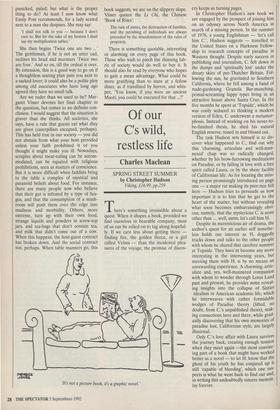Of our C's wild, restless life
Charles Maclean
SPRING STREET SUMMER by Christopher Hudson Viking, £16.99, pp.259 There's something irresistible about a quest. When it shapes a book, provided we find ourselves in bearable company, most of us can be relied on to tag along hopeful- ly. If we care less about getting there finding fire, the golden fleece, or a girl called Velma — than the incidental plea- sures of the voyage, the promise of discov- 'It's not a picture book, its a graphic novel.' ery keeps us turning pages.
In Christopher Hudson's new book we are engaged by the prospect of joining him on an odyssey across North America in search of a missing person. In the summer of 1976, a young Englishman — 'let's call him C.', Hudson suggests — travelled to the United States on a Harkness Fellow- ship to research concepts of paradise in Western thought. Despite early success in publishing and journalism, C. felt down in the dumps and 'spiritually lost' under the dreary skies of pre-Thatcher Britain. Fol- lowing the sun, he gravitated to Southern California, where he fell among a band of nude-gardening Granola Bar-munching, primal-screaming hippy types living in an attractive house above Santa Cruz. In the five months he spent at 'Topside', which he was cosily seduced to thinking a modern version of Eden, C. underwent a metamor- phosis. Instead of working on his never-to- be-finished thesis, he shed his natural English reserve, tuned in and blissed out.
The task Hudson sets himself is to dis- cover what happened to C., find out why this 'charming, articulate and well-man- nered' chap was so radically changed, whether by his brow-furrowing meditations on Paradise, or by falling in love with a free spirit called Laura, or by the sheer facility of Californian life. As for locating the miss- ing person promisingly introduced on page one — a major rat making its presnce felt here — Hudson tries to persuade us how important it is to him that he get to the heart of the matter, but without revealing what soon becomes embarrassingly obvi- ous, namely, that the mysterious C. is none other than .... well, umm, let's call him H.
Despite its meretricious air of drama, the author's quest for an earlier self nonethe- less holds our interest as H. doggedly tracks down and talks to the other people with whom he shared that carefree summer at Topside. They have'nt become any more interesting in the intervening years, but meeting them with H. is by no means an unrewarding experience. A charming, artic- ulate and, yes, well-mannered companion with whom to wonder through Lotus Land past and present, he provides some reveal- ing insights into the collapse of Sixties idealism in American academic life, which he interweaves with rather formidable wodges of Paradise theory (lifted, no doubt, from C.'s unpublished thesis), mak- ing connections here and there, while grad- ually discovering that his own memories of paradise lost, Californian style, are largely illusional.
Only C.'s love affair with Laura survives the journey back, creating enough tension when they meet again —the most convinc- ing part of a book that might have worked better as a novel — to let H. know that the ghost of his youth he has conjured up Is still 'capable of bleeding', which one sus- pects is what he went back to find out and, in writing this undoubtedly sincere memoir, lay forever.


















































 Previous page
Previous page